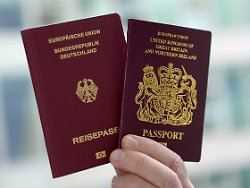The approaching Brexit reinforces the trend towards British emigration to Europe. Many are also naturalized – the German passport is particularly popular.
Brexit drives many British people to the European Union. Since the referendum in 2016, around 17,000 people have emigrated annually, 30 percent more than in the period from 2008 to 2015. This is the conclusion of a study by the Science Center Berlin for Social Research (WZB) and the science cooperation "Oxford in Berlin". The main cause: uncertainty about the economic and social situation in their homeland.
At the same time, many Britons who already live abroad in the EU can be naturalized – according to the study, mainly because there is no clarity about their future freedom of establishment in the EU. Since the referendum, 31,600 British citizens have taken German citizenship. This corresponds to a third of the British population in the Federal Republic. This puts Great Britain in second place in terms of naturalization behind Turkey and is ahead of Poland and Romania. Britons who apply for naturalization before the end of 2020 may become EU citizens and generally retain their previous citizenship.
"The growth rates for migratory movements and naturalization numbers are of a magnitude that is only known as a result of major economic or political crises," says WZB researcher Daniel Auer. In order to find out more about the motives, the authors supplemented the numbers of the official migration statistics with interviews with Britons who immigrated to Germany. The direct consequences of the referendum on migration decisions are therefore clearly visible. The decision to emigrate was sometimes made impulsively and under the impression of a major crisis and uncertain future prospects.
Two thirds of the respondents were prepared to accept a loss of income with the move; many migrated without a job promise. "Brexit means the UK is losing an increasing number of well-educated people who are willing to invest a lot to become part of continental Europe and stay in the long term," said co-researcher Daniel Tetlow.
Tough negotiations
Great Britain left the EU on January 31. Future relationships still need to be settled. In the transition phase until the end of the year, the country remains in the EU internal market and in the customs union. The EU has promised London a free trade area with no tariffs or import quotas. Negotiations have not progressed for months.
Major controversies in the negotiations are the largely unimpeded access by British companies to the British single market, for which Brussels in turn requires London to continue to accept EU social, environmental or consumer standards. The EU fishermen's continued access to British waters and the future settlement of legal disputes are also controversial.
. (tagsToTranslate) Economy (t) Brexit (t) EU (t) Great Britain
